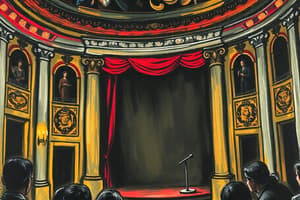Podcast
Questions and Answers
What is the definition of comedy?
What is the definition of comedy?
- a comic play with a domestic setting
- a genre of play that is serious and tragic
- the genre of play that makes you laugh and has plots that end happily (correct)
- a genre of play that provides entertainment that appears serious but ends happily
What does 'comedy of manners' refer to?
What does 'comedy of manners' refer to?
a comic play that derives its humor from the language and behavior of the characters
Define domestic comedy.
Define domestic comedy.
a comic play with a domestic setting and middle-class characters
What is drama?
What is drama?
What is farce?
What is farce?
What does the term 'genre' refer to in the context of drama?
What does the term 'genre' refer to in the context of drama?
What is high comedy?
What is high comedy?
Define low comedy.
Define low comedy.
What is a melodrama?
What is a melodrama?
What is slapstick?
What is slapstick?
Define theatre of the absurd.
Define theatre of the absurd.
What is tragedy?
What is tragedy?
What is tragicomedy?
What is tragicomedy?
Flashcards are hidden until you start studying
Study Notes
Comedy
- A genre dedicated to making audiences laugh with happy endings that reaffirm societal values.
- Sub-genres include comedy of manners and domestic comedy.
Comedy of Manners
- A type of comic play that humorously highlights language and character behavior, often associated with high comedy.
Domestic Comedy
- Set within a domestic sphere, typically featuring middle-class characters and situations.
Drama
- Represents serious themes but avoids tragedy, focusing on the human experience in a more reserved manner.
Farce
- A genre characterized by exaggerated situations and improbable events that aim to liberate through humor.
Genre
- The framework for categorizing dramas based on emotional impact and literary characteristics, with six prominent genres: tragedy, comedy, farce, melodrama, drama, and tragicomedy.
High Comedy
- Similar to comedy of manners, it uses wit and finer social nuances in humor.
Low Comedy
- Focuses on physical humor and characters, eliciting laughter more through actions than dialogue.
Melodrama
- Blends serious narrative with comedic elements, typically featuring a victorious protagonist amidst emotional contrasts.
Slapstick
- A comedic prop from commedia dell'arte, known for its loud, physical humor; also describes exaggerated physical comedy.
Theatre of the Absurd
- Emerged in mid-20th century Europe, reflecting the meaningless aspects of existence through tragicomedy, with notable playwrights like Samuel Beckett and Eugene Ionesco.
Tragedy
- A serious genre that imparts a deeper understanding of life, leading to a calm acceptance of existential truths through the hero's journey.
Tragicomedy
- A dominant genre in mid-to late 20th-century drama that evokes mixed emotions of anxiety and laughter while exploring serious societal issues.
Studying That Suits You
Use AI to generate personalized quizzes and flashcards to suit your learning preferences.





